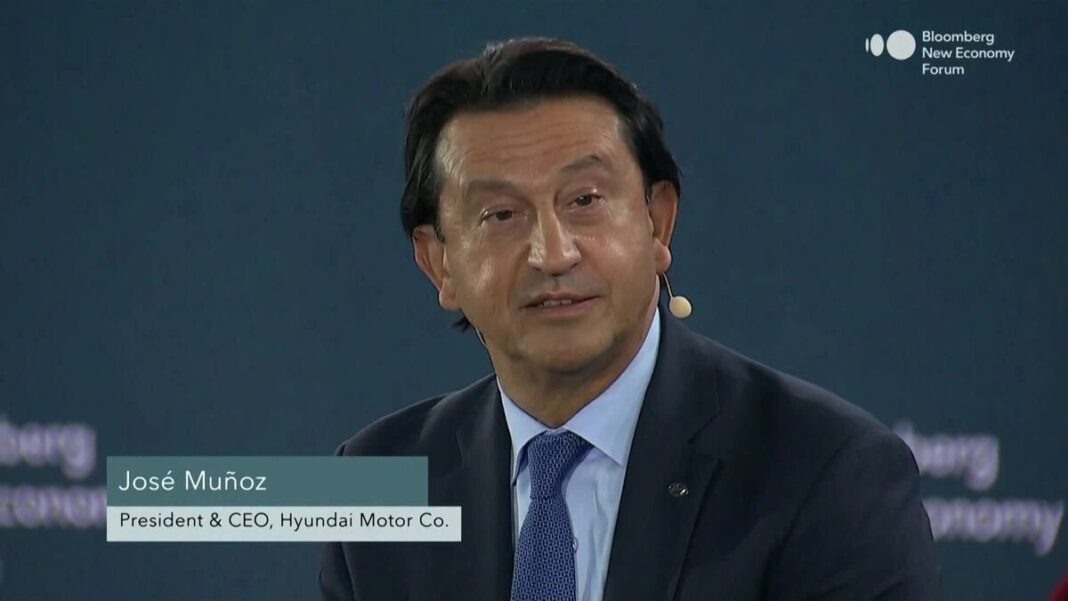Hyundai Motor CEO Jose Munoz Addresses Recent Raid on Battery Plant
At the recent Bloomberg New Economy Forum in Singapore, Jose Munoz, the CEO of Hyundai Motor, found himself in the spotlight as he detailed a controversial incident involving a Hyundai Motor-LG Energy Solution battery plant under construction in Georgia. This incident has raised various questions regarding jurisdiction, state relations, and operational interruptions in one of the industry’s pivotal sectors.
The Unexpected Raid
Munoz began his discussion by recounting the unexpected raid that occurred in September at the Georgia facility. This operation, carried out by officials who appeared to overstep their bounds, sparked immediate reactions not just within Hyundai but also across the automotive and energy sectors. The CEO described the event as shocking and stressed that it could have significant implications for Hyundai’s ambitious plans in the EV market.
As Munoz elaborated, the raid raised eyebrows primarily due to the apparent lack of communication and jurisdiction. He noted that he received a phone call from the White House expressing apologies for the situation, emphasizing the federal government’s concern over the abrupt intrusion into a crucial component of the U.S. electric vehicle supply chain.
Communication from State Officials
In a revealing part of the session, Munoz mentioned a call from the Governor of Georgia, who expressed confusion over the raid. “I don’t know what happened; this is not state jurisdiction,” the governor reportedly stated. This highlights a disconnect not only at the federal level but also within state governance, creating a sense of unease about regulatory coherence.
The implications of such incidents can be far-reaching. For companies like Hyundai, which are investing heavily in electric vehicle infrastructure, unexpected interruptions can derail timelines and increase operational costs. This situation serves as a reminder of the complexities and challenges in navigating local and federal regulations, particularly in a rapidly evolving industry.
Hyundai’s Commitment to the EV Ecosystem
Despite the turbulence, Munoz reaffirmed Hyundai’s commitment to advancing electric vehicle technologies. The company has established ambitious goals for transitioning to sustainable energy solutions, aiming to lead the charge in reducing carbon emissions. The battery plant in Georgia is a key element of this strategy, intended to bolster local supply chains and decrease reliance on overseas production.
The solid investment reflects not just a business strategy, but also a broader vision that aligns with environmental goals and meets the growing demand for electric vehicles. Munoz’s comments reveal an understanding of the importance of robust policies that support sustainable practices while also fostering innovation.
Strategic Partnerships and Future Outlook
To further solidify its position, Hyundai is fostering strategic partnerships, particularly with LG Energy Solution. This collaboration aims to enhance battery technology and production, addressing one of the critical challenges facing the EV market: efficient and reliable battery supply. Munoz’s remarks underlined that partnerships are essential not just for growth but for safeguarding against unforeseen disruptions.
Understanding the landscape of innovation in the automotive industry is crucial. Munoz highlighted how both companies are focused on ensuring that their collaborative efforts remain resistant to unexpected external challenges, while also pushing ahead with cutting-edge advancements in battery efficiency and sustainability.
The Implications for Regulation and Industry Standards
The Georgia incident opens up broader discussions regarding regulation in the EV sector. Munoz’s experience suggests that clarity and communication among federal, state, and local authorities are essential for fostering a conducive environment for innovation. The notion of “not my jurisdiction” points to a potential need for improved legal frameworks that bridge these gaps, ensuring a smoother operational flow for businesses.
As the electric vehicle industry continues to grow, the regulatory landscape will likely evolve in response to challenges like the one faced in Georgia. Addressing these issues proactively can help mitigate risks and promote a more stable environment for companies looking to invest in infrastructure and technology.
Conclusion: Navigating Challenges in the EV Revolution
Jose Munoz’s insights at the Bloomberg New Economy Forum provide a fascinating glimpse into the complexities faced by the automotive industry today. The interplay between business ambitions and regulatory realities will undoubtedly shape the future of electric vehicles as stakeholders navigate these essential conversations.



